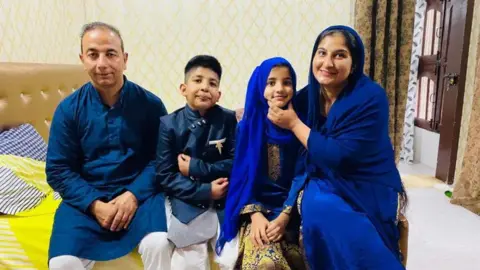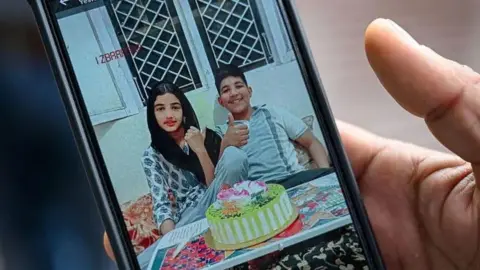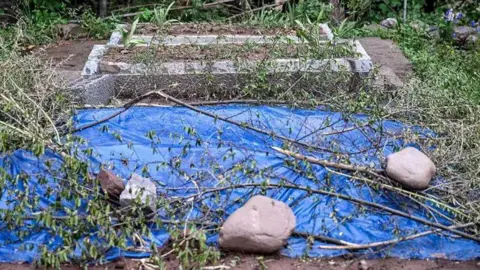BBC Hindi
 Maria Khan
Maria KhanFor Maria Khan, the ceasefire this weekend between India and Pakistan came too late.
Maria, who lives in Indian-administered Kashmir, lost her nephew and niece – 12-year-old twins Zain Ali and Urwa Fatima – to cross-border shelling on 7 May. Their parents, her sister Urusa and brother-in-law Rameez Khan, were also injured and are still in hospital.
Hours earlier that day, India had launched a series of strikes in Pakistan and Pakistan-administered Kashmir in retaliation for an earlier militant attack in Indian-administered Kashmir that killed 26 tourists.
The strikes were followed by a series of military actions from Islamabad and Delhi that went on till Saturday, including heavy cross-border shelling and drone strikes.
People living along the Line of Control (LoC), the de-factor border between India and Pakistan, were the most vulnerable as shells fell near their homes.
Maria, who lives in Poonch, a town in Indian-administered Kashmir near the LoC, is among dozens of people who lost family members in the conflict.
 Maria Khan
Maria KhanOn the night of 6 May, Zain, Urwa and their parents had no idea that in a few hours, India would launch “Operation Sindoor”, the name given to the operation against Pakistan.
Like every other day, Zain and Urwa came back from school, did their homework, played a bit, had dinner and then went to sleep.
It wasn’t yet dawn when the Khan family heard the sound of gunfire just a few kilometres away from their home.
Terrified, they hunkered down at home and waited for a relative to come pick them up, Maria says.
“My sister was holding Urwa’s hand and my brother-in-law was holding Zain’s hand. They had just left the house when suddenly a shell exploded [nearby]. The splinters hit them – Urva died right there and Zain was flung somewhere in the force of the explosion,” Maria says.
She adds that her sister kept calling out to Zain. When she finally spotted him, a stranger was performing CPR on the boy, trying to revive him. But he was unsuccessful.
Meanwhile, Rameez lay bleeding and unconscious. Urusa, in shock after seeing what had happened to her children, was shaken out of her stupor by bystanders and her husband was rushed to hospital – first a local one in Poonch and later to a bigger hospital in Rajouri, about four hours away.
Since his injuries are serious, he was shifted again to a hospital in Jammu city, another four-hour journey.
 Getty Images
Getty ImagesMaria says that Urwa and Zain were the centre of their parents’ lives. Rameez, a teacher, wanted to give them the best education they could get and hence, they shifted to a house that was closer to the children’s school, called Christ School.
On 9 May, India’s Foreign Secretary Vikram Misri confirmed in a press briefing that during heavy shelling along the LoC, a Pakistani shell had fallen behind Christ School in Poonch town and exploded.
16 Indians were killed on the morning of 7 May in the shelling by Pakistan. Pakistan has said that at least 30 civilians have died since India launched its retaliatory strikes on 7 May.
Rameez, Maria says, still doesn’t know about the deaths of his children – his injuries are serious and the family doesn’t want to upset him.
After the shelling on 7 May, hundreds of people left Poonch and other border towns to escape to safer areas. They are slowly returning after the ceasefire.
“The government should have informed people living near border areas earlier, so that they could leave from there and go to a safe place. Perhaps then our children would have been with us today,” she says.
“If war is necessary for the country’s security, we support it,” says Maria.
“We are also saddened by the Pahalgam attack, but we should also think about the lives of those living near the border. Are we not humans?” she asks.
“Now, whether there is a war or ceasefire, our children will not come back.”
Follow BBC News India on Instagram, YouTube, X and Facebook

